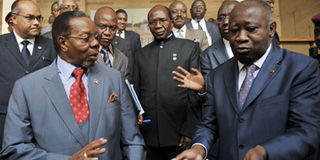African leaders seek way out of Ivorian crisis at Addis meeting

African Union chief and Malawian President Bingu wa Mutharika (L) listens to incumbent Ivorian President Laurent Gbagbo on January 25, 2011 after their meeting at the presidential palace in Abidjan. Mutharika was in Ivory Coast for talks with rivals both claiming to be president as other leaders headed to United States, intensifying diplomatic efforts to end the dispute. AFP PHOTO / SIA KAMBOU
Addis Ababa, Sunday
African Union leaders sought a common strategy on Sunday to resolve Côte d’Ivoire’s political crisis and address other hot spots at a summit also awaiting the birth of a new state of Southern Sudan.
The leaders homed in on the continent’s trouble spots and praised its successes, notably the peaceful handover of power in Guinea and the conduct of the independence poll in Southern Sudan.
Close to 99 per cent of Southern Sudanese chose to secede from the north in a landmark January 9-15 referendum, according to the first complete preliminary results announced on Sunday. (Read: South Sudan votes for secession)
UN chief Ban Ki-moon told the two dozen heads of state assembled at the meeting to “confront common challenges”.
AU Commission chief Jean Ping said he had “followed closely” the recent turmoil in Tunisia, which brought an end to the 23-year rule of President Zine El Abidine Ben Ali earlier this month. The AU had so far remained largely silent on Tunisia.
“I hope the crisis and various acts we have witnessed... we hope Tunisia will be able to surmount them and organise free and fair elections,” Dr Ping said.
He also said the commission has been “following with great attention the situation in Egypt” where riots have claimed more than 100 lives since Tuesday. The UN chief called for “restraint” in the deadly Egyptian uprising.
“With respect to Egypt I would also make a call for restraint, non-violence and respect of fundamental rights and freedoms and human rights,” he told the summit in his opening address.
On the continent’s more long-running crises, Dr Ping said the situation in Somalia “remains of concern.”
Many of the pre-summit talks have focused on the political crisis in Côte d’Ivoire, where Alassane Ouattara has been recognised as the winner of the November presidential poll but his rival Laurent Gbagbo refuses to step down. Earlier Mr Ban said a recount of the disputed ballot in the west African state would be a “grave injustice.”
“Reopening the results of the election would be a grave injustice and set an unfortunate precedent,” he said. Mr Ban underlined the importance of a “peaceful and honourable exit” for Gbagbo, and urged “President Ouattara to form a national unity government.”
The AU on Friday announced the setting up of a five-member heads of state panel to make binding recommendations on the Côte d’Ivoire rivals within a month. AU Commission chief Jean Ping said Saturday the panel would help Ouattara “exercise power” through a negotiated deal.
French President Nicolas Sarkozy, the summit’s guest of honour, was to make a speech on his plans for upcoming G8 and G20 meetings, stressing development aid and transparency in commodity markets, particularly for agricultural products.




